“Feedback is important” has become a mantra across all industries.
That includes hospitality, where professionals are taught to always solicit feedback and ask guests to leave online reviews.
But do you actually know why feedback is so important for your restaurant?
Below, you’ll find four major reasons why customer feedback is important for a restaurant’s financial health, the owner’s decision-making process, and the customer’s experience.
Let’s start with one aspect of your restaurant where customer feedback can help you find hidden treasures and uncover uncomfortable truths: your staff.
Table of contents
- Feedback Shows How Staff Are Performing
- It Helps You Make Informed Decisions
- It Allows for Reputation Management
- Feedback Improves the Customer Experience
- Conclusion
Feedback Shows How Staff Are Performing
In a restaurant setting, staff members go about their work with a high degree of independence because managers can’t be expected to shadow all of their interactions with guests or their work behind the scenes, in the kitchen.
But therein lies the problem: in this environment, how are you supposed to measure the performance of your staff?
How are you to know who deserves a commendation or promotion and who just isn’t the right fit?
For example, staff behavior like what you’ll read below can stay under your radar for far too long.
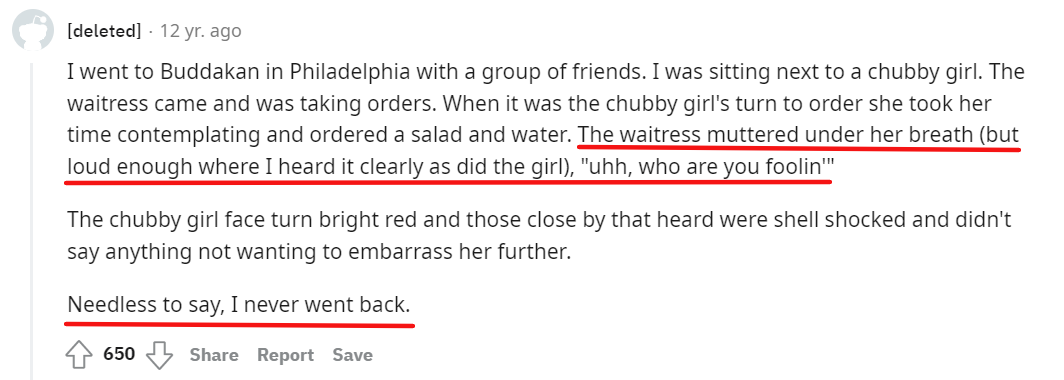
Source: Reddit
Clearly, you need a source of data that will tell you how your customers felt about the service they received and whether they enjoyed their meal.
Your most reliable tool for tracking performance, in that sense, is collecting customer feedback.
Now, your first point of contact when it comes to collecting feedback is your server, as the servers are the ones interacting with the guest.
However, in the case where you want to gather performance data on your staff, it would be prudent to have the manager, or even you as the owner, approach the guests from time to time.
That way, you’ll ensure that the feedback you’re getting is unfiltered, meaning you’ll be able to rely on it when making staff-related decisions.
In addition to that, you can also keep an eye on online reviews as a good source of information about the level of your service.
Have a look at the example below and note how data-rich it is:
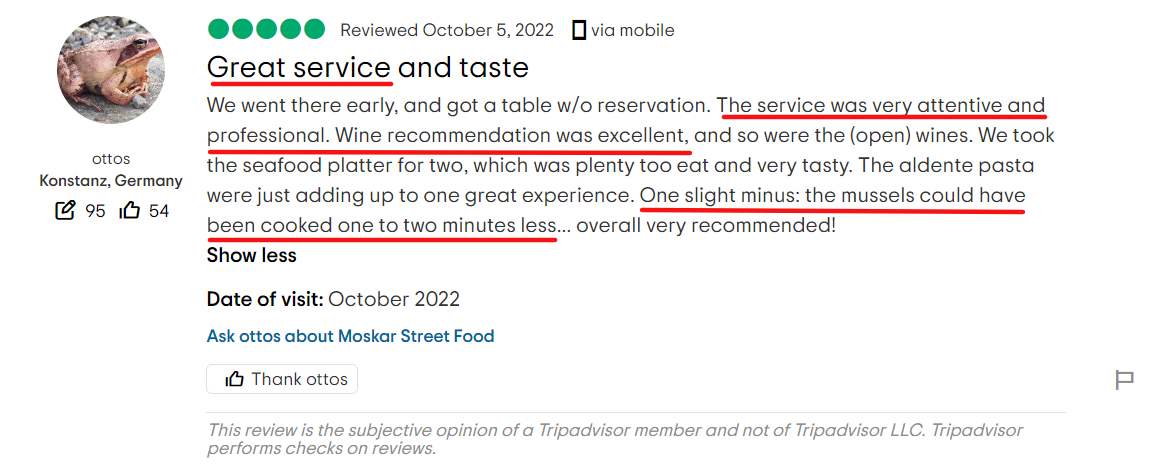
Source: Trip Advisor
As the owner of this restaurant, you would be very proud to see that the guest found the service attentive and professional, and you might congratulate your service staff on their wine recommendation skills.
However, you might also want to investigate if the kitchen staff is a bit inattentive when cooking the mussels.
This isn’t to say your staff should be discouraged from asking for feedback, though, quite the contrary.
Getting direct feedback from customers enables your staff to develop their skill set and keeps them from becoming disengaged at work, which is extremely important when you’re working in a customer-facing role.
The statictic below clearly shows that employees who receive positive feedback are much less likely to be disengaged at work, compared to those who receive no feedback at all.
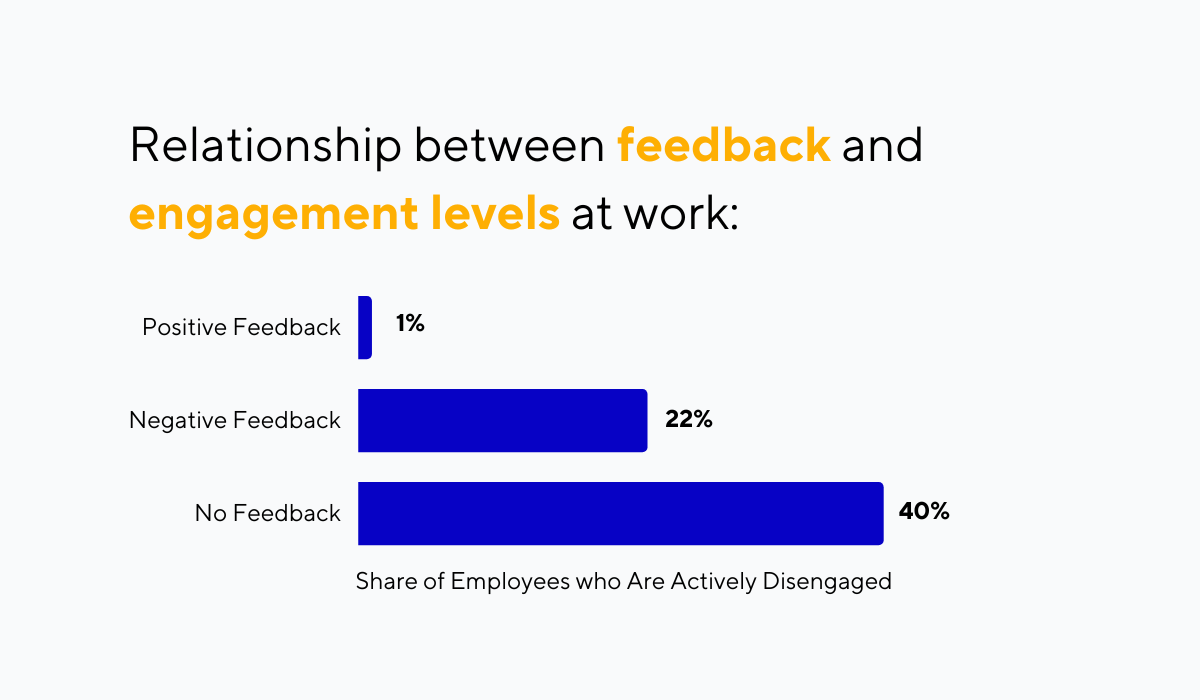
Illustration: Tablein / Data from: Zippia
So, prompting your servers to ask the guest if their wine recommendation was to their liking or allowing your cooks to visit the dining area to ask how the food is are definitely good practices to incorporate.
Securing dependable and actionable data about your team’s performance isn’t as simple as it may seem.
However, collecting feedback directly from customers and paying close attention to their reviews will definitely help you raise up your best performers and form an action plan for those who need improvement.
It Helps You Make Informed Decisions
Speaking of forming an action plan, quality feedback from your customers can be of great help when you’re trying to develop your business in a certain direction or come to decisions with far-reaching consequences.
Some examples here include:
- Making modifications to your menu
- Changing the ambiance or interior design of your restaurant
- Coming up with the best possible reservation system for your dining area
However, quality feedback is not all that easy to come by. As we said in the previous section, most of your guests will hesitate to say anything negative about their experience in person.
When they leave the restaurant, very few of them will revisit the experience by posting an online review.
As a matter of fact, statistics show that just one in 26 unsatisfied customers ever voice their concerns.
The other 25 just stop being a customer and go elsewhere.
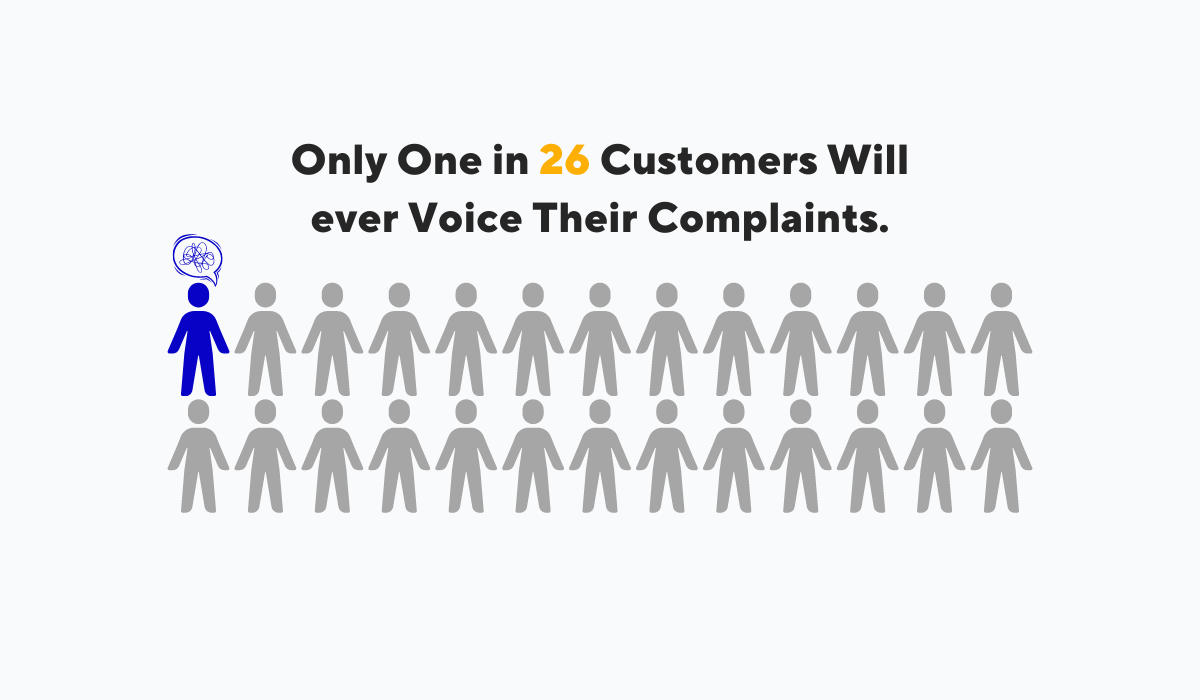
Illustration: Tablein / Data from: Huffpost
But those unfiltered, even bad reviews are exactly what you need to make improvements to your business and take the next step in your development.
Let’s take a look at a real-life example of this and find a possible solution.
The team at the Kimchi restaurant in California, USA, was adamant about continually improving their service from the day they opened their doors.
But, they soon found they didn’t have the data needed to make informed decisions.
Since the very first day we opened, we put maximum effort in[to] creating only the best quality experience for our restaurant guests. We understand that clients’ reviews are crucial, especially at the very beginning. However, when receiving these anonymous comments, we were unable to evaluate the real quality of our work and weren’t even sure if we were going in the right direction.
Scattered anonymous reviews proved to be too unreliable for this restaurant to base its decisions on.
It was a good thing they noticed this blindspot, as they could have made a wrong turn with their business.
Instead, this realization propelled them to find a way to collect better, more dependable feedback.
Their solution was to implement the Tablein online reservation system, which has a nifty feature: automatically reminding guests to write reviews after they leave the restaurant.
The procedure here is simple. When making a reservation online, the guests have to pick a date, time, and party size for their reservation.
They must also leave their phone number or email address to confirm the booking.
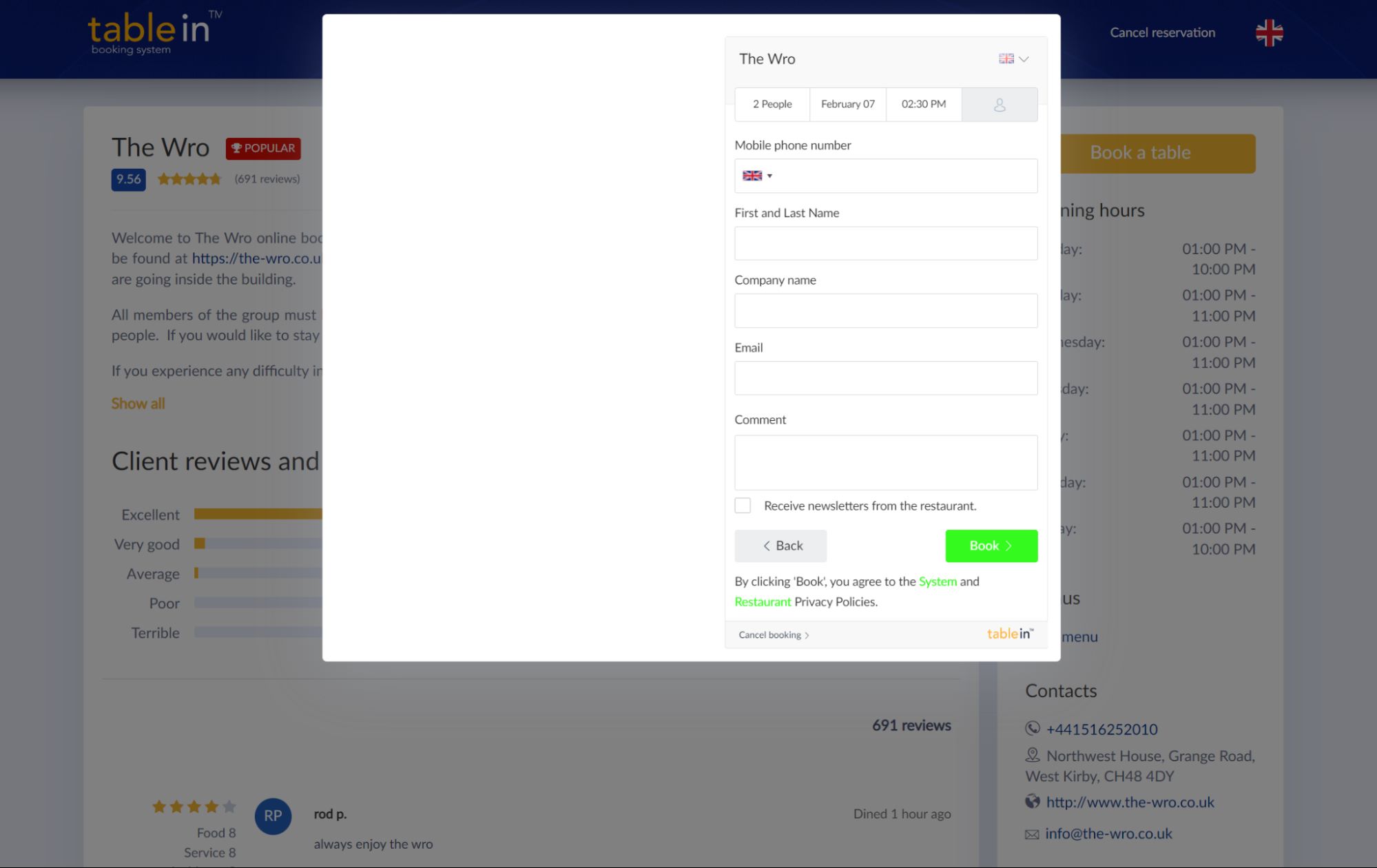
Source: Tablein
A day after the guests’ visit to the restaurant, the system automatically sends them a notification, asking them to leave a review.
Once they do, the review is published on the restaurant’s website, in the reservations section (powered by Tablein), where it can help other guests decide to book a table and provide valuable feedback to the management.
Have a look:
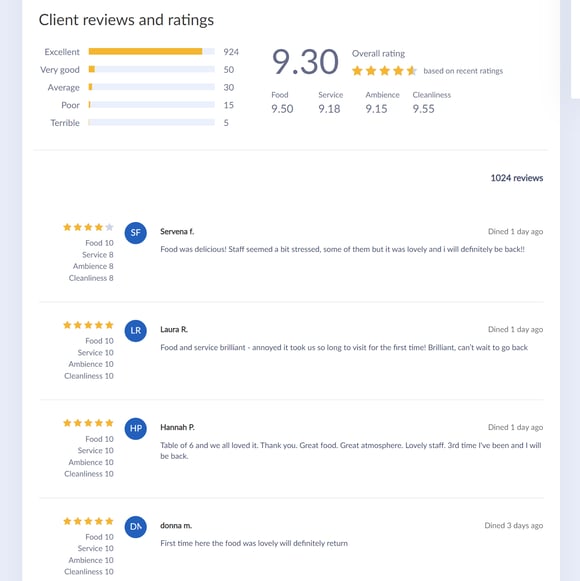
Source: Tablein
What’s so great about having feedback integrated with a table reservation system?
Well, each review can easily be attributed to the right reservation, so it’s easy for the management to pinpoint the staff members who served the guest, the meal they had, and the environment they dined in.
With this kind of reliable data, it’s much easier to form and execute important business decisions.
Your guests are the ones who will be experiencing your restaurant firsthand and deciding its worth.
Therefore, it makes sense to guide your business decisions using the kind of reliable customer feedback only resources such as Tablein can provide.
It Allows for Reputation Management
There’s one old saying that doesn’t really hold true anymore. And that’s “all publicity is good publicity.”
In the age of online reviews that are visible to any interested party, negative feedback (whether it’s based on fact or not) can kill a business before it ever has a chance to flourish.
That’s because almost all internet users zero in on negative reviews, specifically, when contemplating their choices.
Ratings are also significant here, as people will refuse to do business with a company (restaurants included) if its rating drops below a certain point.
For example, data shows that customers tend to do business with companies that have a minimum rating of 3.4 stars, not less.
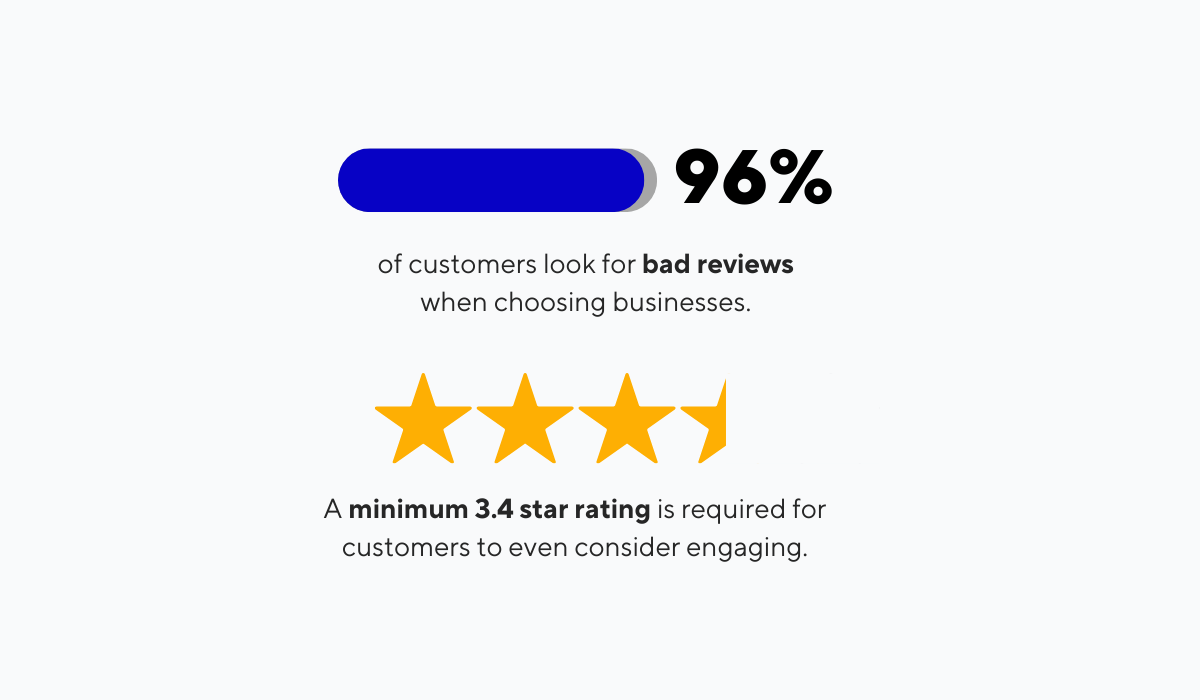
Illustration: Tablein / Data from: Power Reviews and Podium
Are restaurant owners powerless to protect their reputations against this?
Not if they get ahead of the problem by being proactive and asking for feedback themselves.
Let’s go over some tactics on how to do this.
Firstly, you can train your staff to spot guests who look like they’re really enjoying their experience.
People who were impressed by the menu or delighted by the sight of your dishes, for example.
When it’s their time to settle the bill, you can direct the server to encourage the guest to share their experiences on your preferred resource, such as Google or TripAdvisor.
Here’s an example of one such positive review from TripAdvisor:
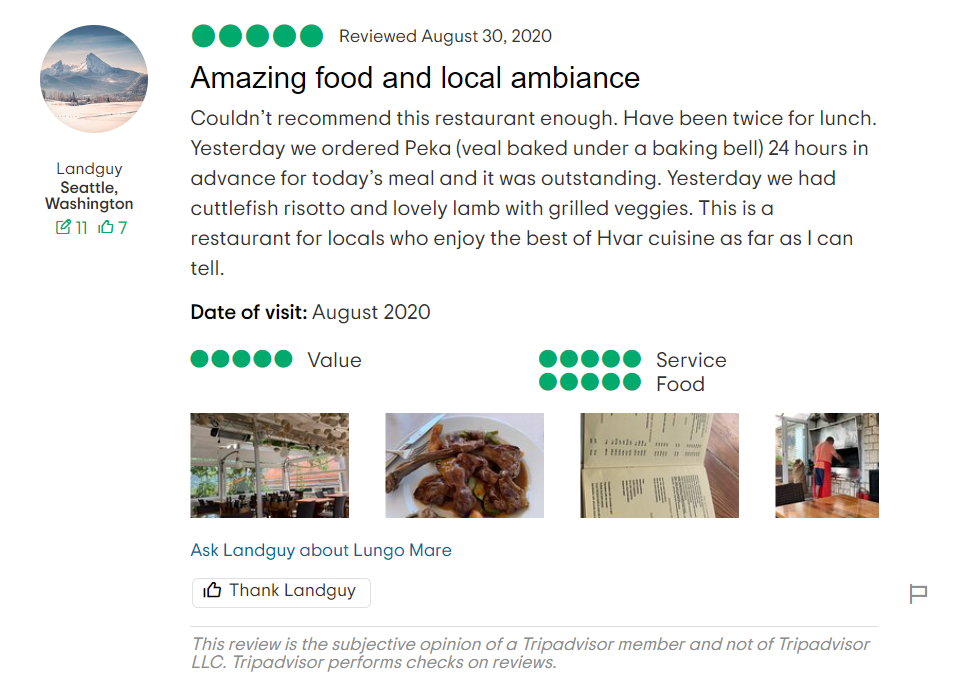
Source: TripAdvisor
If you do this, you can influence which guests leave a review and stack the odds in your favor.
And what about the guests who seem to be unhappy with their evening?
Well, a good strategy might be to approach them and ask for their impressions.
You can have the server or manager ask how everything is and listen to their grievances patiently.
After they’ve presented their case, you can apologize and offer them some sort of compensation—free dessert, perhaps.
With their complaints heard and dissatisfaction amended, the guest will be less likely to seek revenge online.
Use this tactic sparingly and be as subtle as possible, though.
Other guests within earshot might not be happy to hear that a complaining guest is getting free dessert while they still have to pay for theirs, even though they have been nothing but polite and pleasant.
That’s exactly what transpired in this next example:
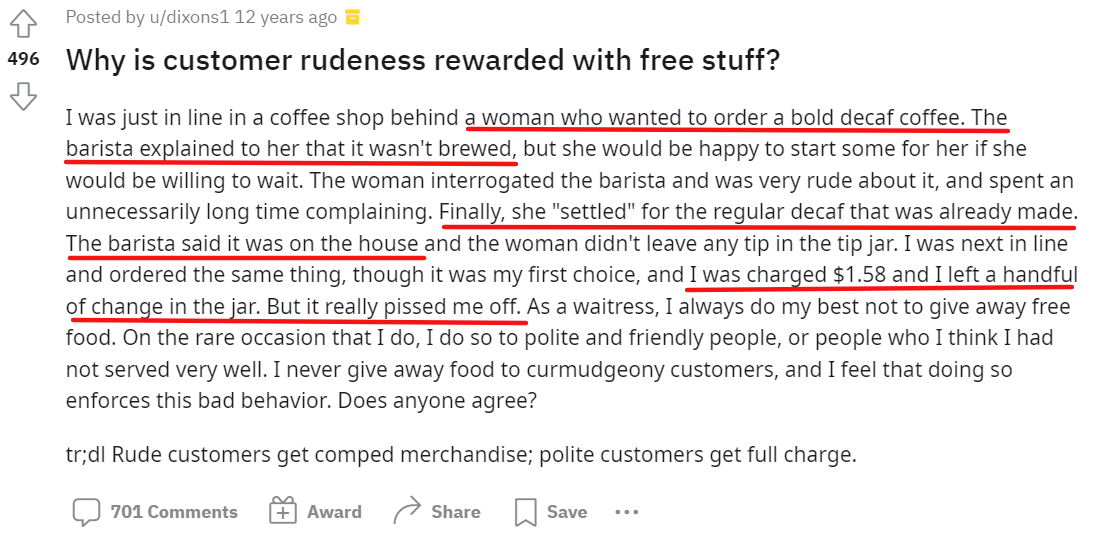
Source: Reddit
Of course, this negative feedback might also lead you to make an improvement to your business, as we discussed earlier, so take advantage of every opportunity to engage with a complaining guest.
Long story short, reviews are a powerful thing, and they can be a deciding factor in your restaurant’s success.
However, some smart reputation management through feedback collection can help keep the odds ever in your favor.
Feedback Improves the Customer Experience
Our last reason for gathering customer feedback may just be the most important one. Quality feedback can help you improve the experience of your customers over time.
That’s because acting on gathered feedback means putting customers in the driver’s seat and letting them steer your restaurant’s development in the direction that best satisfies their needs.
The benefits you get here are loyalty from your guests and more revenue for your business because good customers keep coming back and often recommend your restaurant to other people in their social circle.
The link between customer experience and feedback is a very strong one.
Even the act of asking for feedback lets your guests know that you care about them and want to accommodate them, which makes them experience your restaurant in a more positive way.
However, to really make a positive difference, simply collecting feedback isn’t going to be enough.
You will also need to follow through and act on it. Then, customers will much happier, as the data below shows.
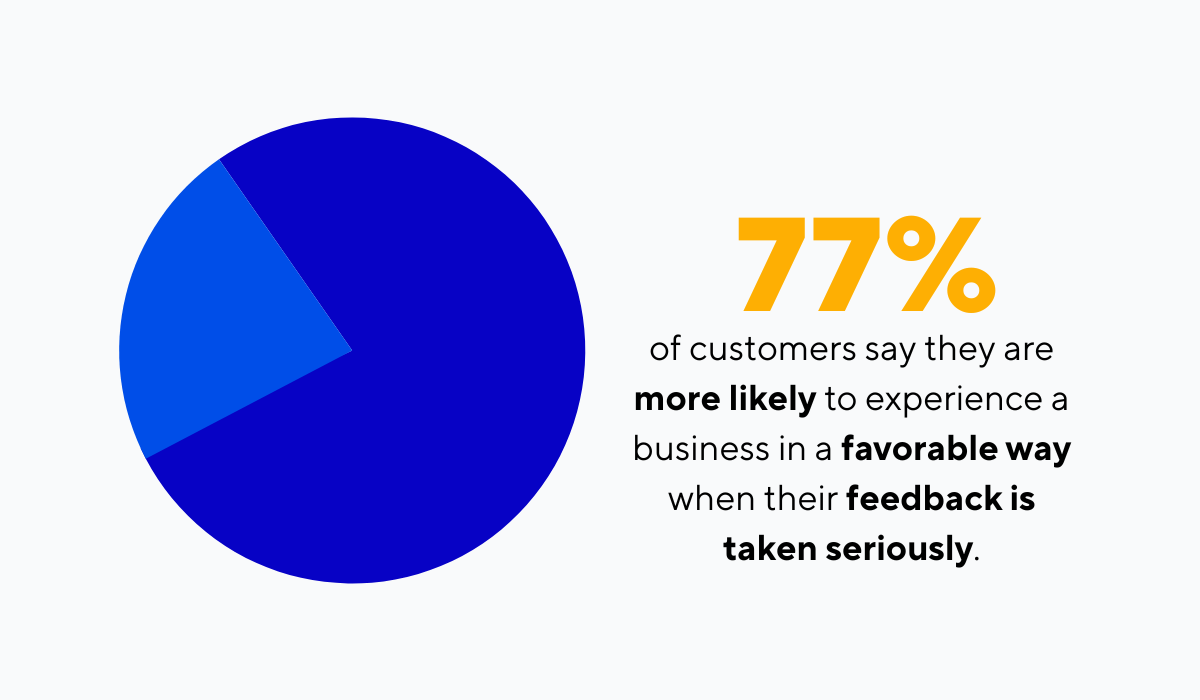
Illustration: Tablein / Data from: Microsoft
Here’s a good example. Imagine you had a guest that asked you to bring back their favorite menu item.
This next piece of feedback was posted using Tablein’s reservation system (discussed in the second section of this article).
Remember, Tablein allows you to tie reviews to individual reservations, meaning you know exactly who left this piece of feedback and have their contact information.

Source: Tablein
Now, imagine if you acted on that feedback and let your customer know that pancakes and French toast were back on the menu.
You would probably be left with a guest who feels appreciated and heard and earn a loyal customer who thinks most highly of your restaurant.
That’s how much power you have once you start gathering feedback and taking action to implement it in your service.
You can enhance your guests’ experience and inspire them to keep coming back for more.
Conclusion
Customer feedback is a powerful, extremely valuable resource.
It can help you gain intel on the aspects of your restaurant that are difficult to observe directly, help you direct your business into a successful future, and build life-long relationships with your guests.
All of this becomes available to you once you focus on engaging with your customers directly, keeping an eye out for online reviews, and employing tools that make feedback collection easier and more reliable.
We hope this article has shown you just how important gathering feedback is and convinced you to give this business practice more attention going forward.
Get a 30-day Exclusive Trial
As a Tablein blog reader, you’re eligible for an exclusive 30-day free trial to experience our simple reservation solution for your restaurant.
Enter your business email, and we’ll send you all the steps needed to create your account.
Share this
You may also like

Ways to Gather Customer Feedback for Your Restaurant
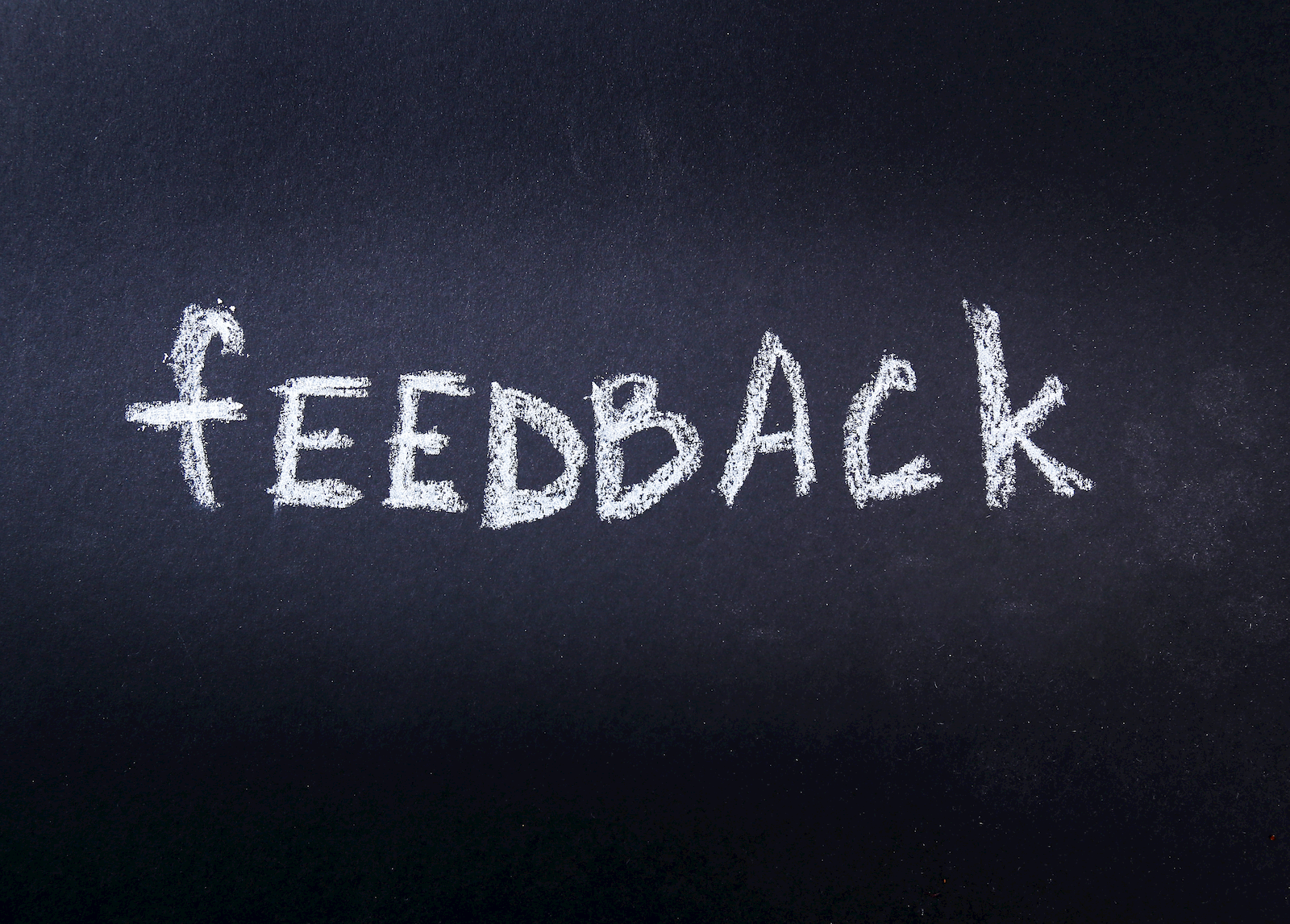
Feedback Importance for High Performing Restaurants
